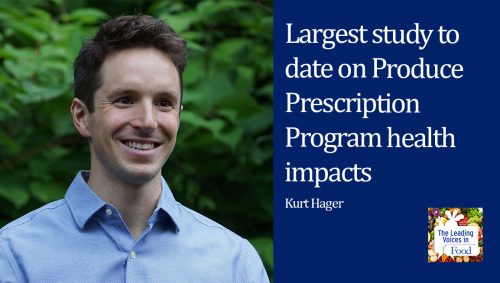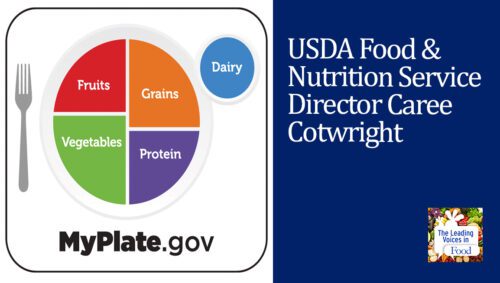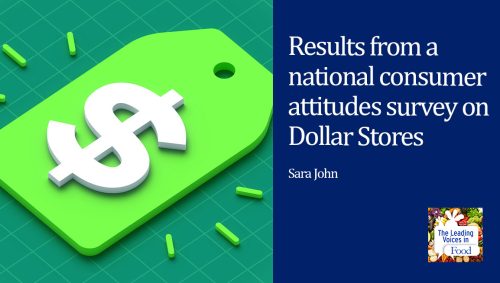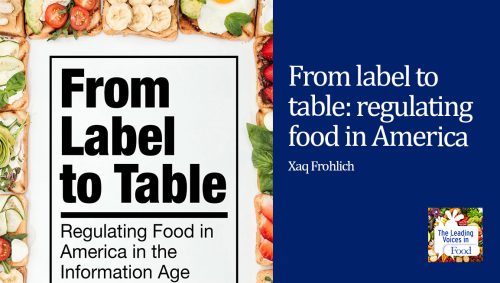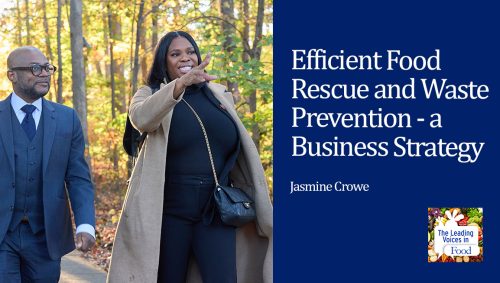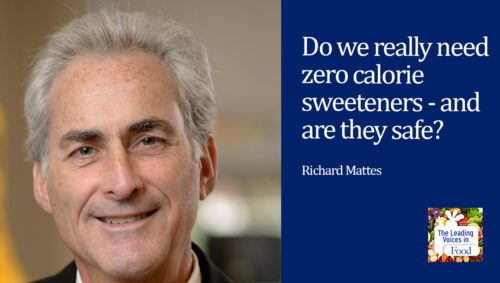The Leading Voices in Food
E142: Recognizing the Connection Between Obesity and Endocrine Disrupting Chemicals
A paper published recently by the journal Obesity Reviews brings attention to the role of EDCs – endocrine disrupting chemicals – in weight gain, and in the very high rates of obesity around the world. The results of this review are enlightening and alarming, I must say, even to the two of us who wrote the paper. Our guest today is the lead author of the paper, Dr. Timothy Lobstein. Tim recently retired as director of policy at the World Obesity Federation in London, UK, and is currently visiting professor at Sydney University in Australia. He is an advocate scholar and policy expert, and one of the world’s most effective and impactful voices in addressing obesity. He has several decades experience on obesity efforts around the world, working with groups, such as the World Health Organization and the United Nations Children’s Agency UNICEF. And in 2020, he was the inaugural winner of the Philip James award.
Subscribe: Apple Podcasts | TuneIN | Google Podcasts | SoundCloud | PocketCasts | Radio Public
Tags: Childhood Obesity | Food Industry Behavior & Marketing | Food Safety & Food Defense | Obesity |

Dr. Timothy Lobstein retired as Director of Policy at the World Obesity Federation in London, UK, and is currently visiting professor at Sydney University in Australia. He is an advocate, scholar, and policy expert and has, in my opinion, one of the world’s most effective and impactful voices in addressing obesity. He has world on obesity efforts around the world, and with groups such as the World Health Organization, and was the inaugural winner of the Philip James Award.
Interview Summary
So let’s dive into the details of the paper because it produced some pretty remarkable things. So first tell us if you would, what are endocrine disrupting chemicals?
These are chemicals in the environment that affects our hormones and they can mimic our hormones and they can block our hormones and they can alter their function. So as you know, hormones are finely tuned balance of chemicals that regulate reproduction and cell development and appetite, and many other functions, and they make up, what’s called the endocrine system and that controls how we grow and our moods and our health. Now in the last few decades, we’ve become aware that there are chemicals we absorb from the environment that can disrupt the normal function of our endocrine system, hence the name endocrine disrupts.
So how present are these in our lives and what are some of the key sources of exposure?
Well, the more we look, the more we find them. The last few years have shown a wide array of chemicals that can have disrupting effects, especially the manmade chemicals that are used in modern life, including for example, plasticizers that are used in the production of plastics to keep plastic from hardening and becoming brittle. So in the food industry that would include plastic bottles and film wrap, and also the inside lining of canned food, for example, where these plasticizers are used, but it’s not just the food supply. There’s similar chemicals are used in cosmetics and sunscreen and in household furnishings and automobile tires. So these chemicals have become increasingly present in the air and on our skin and in our food and water supplies and concern over these chemicals has led some countries to ban their use in baby bottles and baby teats. But even there, there are worries that the replacement chemicals are also a source of endocrine disruption.
It seems like from the things you’ve described – plastic wrapping for food and plastic bottles – that they’re all over the place. So can you give us some context for biological evidence that this exposure is actually getting internalized and that people have these things in their bodies?
There is because we have a variety of ways of approaching this. We can look at how they affect animals, and then we can look at human surveys and test for blood content and urine content to see how these chemicals are getting into humans. And the surveys, particularly in Europe and North America are showing widespread consumption of these chemicals. Inadvertent consumption, as I say, through air, through skin, through water and food. So yes, they are widely prevalent in the human population now.
People wouldn’t intuitively think that such chemicals might be related to risk of obesity, because your mind automatically goes to calorie overload in the population and too little physical activity. So as interest in the EDCs related to obesity, new and what got you thinking about writing this page?
We have seen studies 20, 30 years ago, showing that there are concerns around these chemicals causing problems for reproduction and also triggering cancer growth because they trigger cell growth, but their effects on appetite and on the formation of fatty cells suggest that there are links to weight gain. And there’s now increasing evidence that populations with high levels of these chemicals in their blood have a higher prevalence of overweight and obesity. So these are not just animal laboratory studies. These are now being shown in surveys of human populations, as I say, in Europe and North America. So we are definitely concerned that there is a, a trigger here that may be happening in humans.
So I knew that there had been papers here and there showing up in the literature, suggesting that such a relationship might occur. But when you stepped in and wrote this paper recently, you felt that I know, and as we wrote this paper together, there was sufficient evidence now to really say that there might be a pretty strong link. Would you say that’s true?
Yes, I would say that the bottom line is that the endocrine disrupting chemicals in our environment are a potentially important cause of weight gain. I mean, the science, as you say, has developed very rapidly, mostly in the last 10 or 15 years, but there are now approaching a thousand odd scientific papers on the issue. And in our paper, we looked at 60 old systematic reviews and meta-analysis of the science and virtually every one of these reviews agreed that there was a potential problem here.
So let’s put this in the context then how strong is the relationship between exposure to EDCs and risk for obesity compared to other known risks factors?
Yes, that was one of the questions we wanted to answer. I don’t know if we’ve fully explored it yet. And I think there’s plenty of scope to have more work done on this, but we did want to ask what are the potential effects, these chemicals compared to food patterns or the amount of exercise people take, because the usual argument says that to lose weight, you need to eat a healthy diet and exercise more. But when we looked at the potential effect sizes of endocrine disruptors, we found that they were up there with diet and exercise that surveys of the most common endocrine disruptors show that people with high levels in their bodies can have twice or three times the prevalence of obesity compared with people with lower levels. And that sort of effect is at least as serious as drinking two or three sugar sweetened beverages every day, for example, or two or three hours extra sitting, watching TV.
Well, you know, this is big news. So I just wanted to underscore this particular conclusion from the paper that everybody would agree that dietary contributors and lack of physical activity are our major drivers of obesity. And then here you come saying that it looks like this is on a par with them. So this is really very important news in both understanding rates of obesity and also understanding what might be done about it. Has anybody ever looked at historical trends about rates of obesity and exposure to EDCs in the population?
I don’t believe they have. I mean, our evidence about EDC is linked to obesity. As I say is only in the last 10 or 15 years, the rates of increase in plastic productions, which might be probably the major cause of EDCs in our diets. At least if not in the atmosphere have only really escalated in the last 30 or 40 years. And it’s quite hard, I think to control if you like the rate of increase for one against the other and ask, you know, is that the cause or are other factors that cause it it’s a difficult epidemiological question. And what we cannot do of course are experiments that deliberately increased consumption of an EDC and then ask how much a person gaining weight, because that would be unethical. So we have to rely on these sort of external surveys. And if you can’t tell cause and effect from a survey, you can show the trends are in parallel. It’s hard to show cause and effect. So I think we need to do a little bit more work on this to see if we can tease out the various issues. I say that because exercise trends have not really changed very much in the last 30 years and even food consumption that calorie levels are not that much different over the last 30 or 40 years, particularly in Europe or in North America, it’s been fairly flat, but obesity levels, particularly in children have been increasing. And at the same time, the levels of endocrine disruption in the environment have been increasing. So I think there’s a serious question doesn’t need to be answered.
So Tim, you mentioned children and one would imagine they’re a special concern given the development that’s occurring, is anybody looked at EDCs and children?
Oh yes. Well they haven’t in a population survey sense and there’s a good paper that was done looking at body weight and EDC in urine of children and showing that the quarter of the children with the lowest levels of EDC in the urine were at half the prevalence of obesity compared to the three quarters of children that had high levels of UVC is in their system. So there’s a clear relationship epidemiologically in the survey material, but cause, and effect is still another question.
The numbers that you just pointed out given the cause and effect caution there show not only the relationship, but potential powerful nature of that’s coming through time and time again in these studies that you’re discussing. So let me ask about one particular part of the diet sugary beverages. And so there are some fascinating issues in this context. Can you explain?
Well, yes, they’ve been surveys of people’s consumption of beverages associated with weight status showing of course, as usual that sugary beverages are associated with higher body weight in a sort of cause and effect where you would expect, but there’s also evidence that diet beverages with no sugar are also linked to a higher body weight. So that’s a bit of a puzzle because you could argue that it’s because some people who are already living with a high body weight or perhaps cutting back on their sugary beverages and consuming more diets. So that would sort of skew the pattern a bit, but it could equally be argued that both bottles and cans rather than the sugar is what’s causing the problem that the endocrine disrupting plasticizing chemicals that line the inside of soda cans and that are used in making the bottles that you serve up sugary beverages and diet beverages in, that they are the cause but we don’t know what the answer is here. It’s a, it’s a speculation here, but we do know that there’s evidence that people who have more processed foods in their diet are more likely to have a higher level of endocrine disrupting chemicals circulating in their body.
I found this to be a particularly interesting part of working with you on this paper, that if you think about doses of things that are contributing to obesity, somebody who’s drinking sugary beverages are basically getting doses of calories from the sugar. And then of course getting a dose of the endocrine disrupting chemicals. And so you’d expect especially high rates of obesity, which is exactly what the literature shows, but this finding about diet beverages is fascinating. And so you’d expect people to have higher rates of obesity who are drinking diet beverages. And you mentioned the difficulty of understanding that relationship. But given that they’re getting a dose of the endocrine disrupting chemicals, that this could help explain that relationship. And I don’t think the field has thought about this very much. Would you agree with that?
I would. And I don’t think people realize that endocrine disrupting chemicals have at least three ways in which they’re contributing to weight gain, they can stimulate appetite. So even if you’re trying to lose weight, you may feel hungry because of the EDCs that you’re still consuming or that you have already circulating, but they also contribute to storing more fat in fat containing cells in your body. And they contribute to creating new fat containing cells. So they act quite powerfully and there are several different chemicals that are at work here. So it’s a complex system, but it’s a pretty convincing one to me.
So I’d like to ask you in a moment about the policy implications of this, but before I do that, do you see evidence that the major experts around the world and the organizations that deal with obesity, like the world health organization or the obesity society and America or the world obesity Federation that you’ve been so involved with for so many years, is there a lot of people paying attention to this and starting to think about this as a potential major driver will be sitting in something that needs more policy attention?
I think there were a little chinks of light occurring here and there, but on the whole, no, there are some policy papers that talk about potential environmental causes of obesity might include toxins, but they don’t talk about the strategies that are needed to deal with it. So you have to go elsewhere to look for policy proposals. And that’s usually in a sort of reproductive system or cancer determining systems where EDCs are now more completely recognized as being a problem in the obesity policy area. It’s still really new. And I think that’s where I’m hoping that our people will have a bit of an impact because it did look at 50 of the sort of leading governmental and inter-governmental policy statements on obesity strategists and only four or five of them, actually even referenced possible chemical influences. And none of them really had a strategy for dealing with them.
You know what this reminds me of, and this may not seem like a reasonable parallel to you, but I’m thinking back on the early days of interest in food and addiction, and now there is a robust literature on this and people, in the food and nutrition and obesity fields are thinking about it much more than they did before. But in those early days, it wasn’t the BCT or nutrition field that started an interest in this. It was the addiction field. And then finally the nutrition related field started to catch up. I wonder if that might be true here to some extent that it may not be the obesity field that drives this interest, but it could be the people who were working on the EDCs and environment or health or things like that outside of our field who really do the majority of the work and ended up pushing us forward. And then finally our field might catch up. What do you think?
Well, I agree with you and of course you and I likely to be cited as the pioneer, as I hope, and I’m trying to bridge these gaps, but it also speaks about if you like the sort of wider interconnectivity of different aspects of commercial and policy issues that affect health and how they interact with each other. So I’m fascinated by the way, in which, for example, policies and strategies to try and deal with global warming or to deal with environmental pollution will also have an impact on human health and even on obesity prevalence. So I think all these things do interconnect, but it’s a matter of drawing those connections and trying to get them included in policy decisions, which I think we need to talk about.
You and I go back many, many years and have been the countless meetings together, have written things together and have done a lot of thinking together about the field. And it’s been a real honor for me to be involved in this and in this particular project, but also things we’ve done in the past, but this strikes me as something of particular importance and something where I really believe you’ve done a major job of helping move the field forward. So let’s hope people pay attention like they should. So let’s get to the policy things now. So what do you think are some of the main policy implicate?
I’m going to raise two particular points. I think first, when you ask people to lose weight by dieting and exercising, what are you doing? Because if it’s not actually dietary intake or even exercise, that’s causing their weight gain, then they’re going to fail. It would be a useless thing to ask them. So if people are still being exposed to endocrine, it’s going to make them hungry, and there’s going to add to their stored fatty cells. So blaming people for their weight gain or failure to lose weight when it’s actually being caused by invisible chemicals in the environment or in food wraps in packages or furnishings or roadside air pollutants. I mean, you can’t avoid these chemicals. So it is not your fault. If you gain weight or find it hard to lose weight. And I think that is a hugely important step forward in this whole issue about stigma and obesity, weight bias and so on. And the blame game that’s played by politicians. So that’s the first policy point that I want to bring out from here that it’s not the individual’s fault. Particularly if endocrine disrupting chemicals are contributing to their weight gain. Secondly, the policymakers who designed government interventions to improve population health, they need to look at these manmade chemicals. If you think about it, it’s a government regulation to take the lead out of automobile fuel or the asbestos out of houses when it was showing how poisonous these chemicals are. So I think now we’ve got to get governments to act and act fast to reverse the flood of these endocrine disruptors. That means tackling the commercial interests that use these chemicals so that they change their products. Now I know that getting commercial producers of harmful chemicals to change their practices is a huge political issue. And I guess you might want to discuss what has to be done in another of these excellent podcasts.
So Tim, might there also be some interesting advocacy coalitions to be built in this field with the people who are working on the environmental part of this and the health part of it, coming together with the people that are working on the diet, nutrition and obesity part of it.
Oh, definitely. In fact, it spreads even wider. I think that the coalitions that need to be built have to tackle this issue in at least three dimensions, because firstly you have to weaken commercial influence on government strategies and government thinking. And that means weakening their lobbying, weakening their political donations. So we need to join with others who are trying to expose and reduce the lobbying that gets done by industry. But you also need to strengthen popular demand, getting the media and popular messaging on side, you need to make politicians feel the heat, making it easier for them to intervene and to regulate against commercial interests. And you need to show that failure to act costs more than acting now. Now we know this is the case with global warming and with environmental pollution, not doing anything is not an option. So I think there are plenty of parallels and links between these issues.
There might be some interesting litigation opportunities here too, because you can imagine the people who are working on the environmental parts of this are thinking about the damage to the environment and the need to recover those damages from the companies that are creating the problems. But they’re probably not thinking about obesity as one of the potential outcomes of this, which of course carries enormous cost to society. So that might be part of an interesting picture going forward to at least in some countries.
I see another paper coming on, Kelly.

